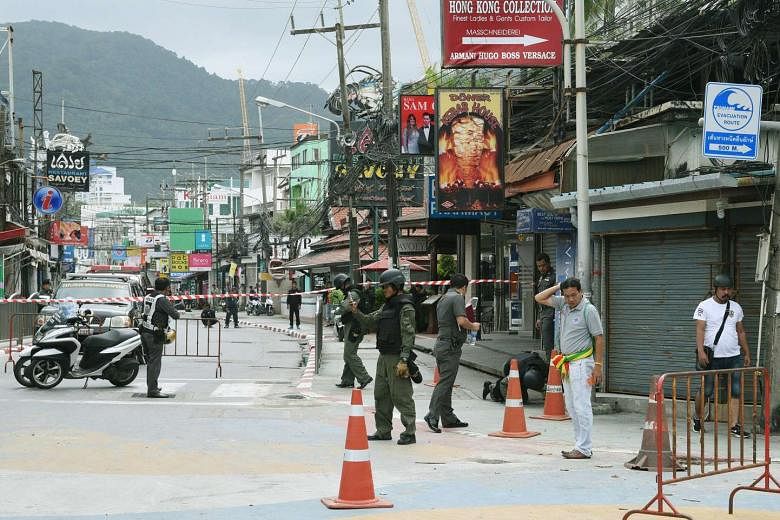BANGKOK (AFP) - A bombing spree targeting Thailand's tourist hotspots, in the latest setback for a nation that has endured a decade of turmoil, has sent authorities scrambling to identify a motive and find the perpetrators.
So far there have been 11 blasts in 24 hours, extending from the southern town of Trang right up to Hua Hin, the genteel seaside town which is home to the revered royal family's summer palace.
Small bombings have been common during periods of political tension in Thailand, but the recent attacks were unusual as they were aimed at tourists, a mainstay of the economy and not often caught up in the violence.
They were also far from the "deep south" where a Muslim insurgency has raged for decades, and where bombs targeting ordinary people are tragically common.
Thai police have said the bombings were acts of "local sabotage" and not the work of either international terrorists or the southern insurgents.
However, they have been criticised in the past for hasty denials. Police have similarly refused to call the August 2015 bombing at a Bangkok shrine, which killed 20 people, a terrorist attack.
Claims of responsibility have been scant throughout Thailand's long history of political violence, including the troubles in the south and mysterious grenade blasts during tussles between rival political camps.
As a result, observers are looking at the range of "usual suspects" to see who is the most likely culprit behind the latest spasm of violence.
HOME-GROWN MUSLIM INSURGENTS
Some analysts have tentatively pointed towards insurgents fighting for greater autonomy in the country's three Muslim-majority states bordering Malaysia and annexed by Thailand a century ago.
Almost 6,500 people - mostly civilians - have died since 2004 in the area, which is plagued by near-daily shootings and roadside bombs.
If the insurgents are confirmed as the culprits, the attacks would mark a dramatic escalation of their usual tactics - they have typically limited their assaults to the border region, which is far from Hua Hin and the other areas targeted.
"The attack on Hua Hin seems like an direct affront at the Kingdom of Thailand," said Paul Chambers, an expert on the Thai military.
The junta has reached out to insurgents since its power grab but failed to revive peace talks with the shadowy network of rebels.
POLITICAL RIVALS OF THE JUNTA
The attack comes about a week after Thailand's military rulers saw their controversial new constitution approved, a setback for the country's already weakened democracy movement.
The junta took power in the bitterly divided kingdom in 2014 after prime minister Yingluck Shinawatra's government was booted from office.
Thitinan Pongsudhirak, a politics expert with Chulalongkorn University in Bangkok, said "political forces who lost out in the referendum approval" were most likely behind the attacks.
"The timing is striking," he said. "This is a direct frontal, blatant challenge to the military regime. A military government like this is supposed to be about law and order."
INTERNATIONAL MILITANTS
Various Islamic militant groups have carried out many attacks in other parts of Southeast Asia over the years, including the 2002 Bali bombings that killed more than 200 people, mainly foreign tourists.
Recent attacks in Muslim-majority Indonesia and Malaysia have been carried out by local radicals linked to Islamic State in Iraq and Syria, which has proven a potent new rallying cry for the region's radicals.
Analysts say that after enjoying success with Malaysians and Indonesians, it is possible ISIS would try to recruit Thais. However Thailand's Muslim militant groups have so far been resistant to overtures from global terrorists.
UIGHURS
There have been increasing signs of radicalised Chinese Uighurs appearing in South-east Asia in the past two years.
Two members of the Muslim minority were arrested over last year's Bangkok shrine bombing that killed 20 people, mostly ethnic Chinese tourists.
The attack was the single worst assault on the kingdom in recent history and struck almost exactly one year ago on August 17.
The suspects are due to go on trial later this month. Both have denied any involvement the bombing, which remains shrouded in mystery.
Indonesian radicals fighting with ISIS have also recruited a handful of Uighurs in the region and sent them to the archipelago to strengthen extremist networks, although most have been killed or captured.

